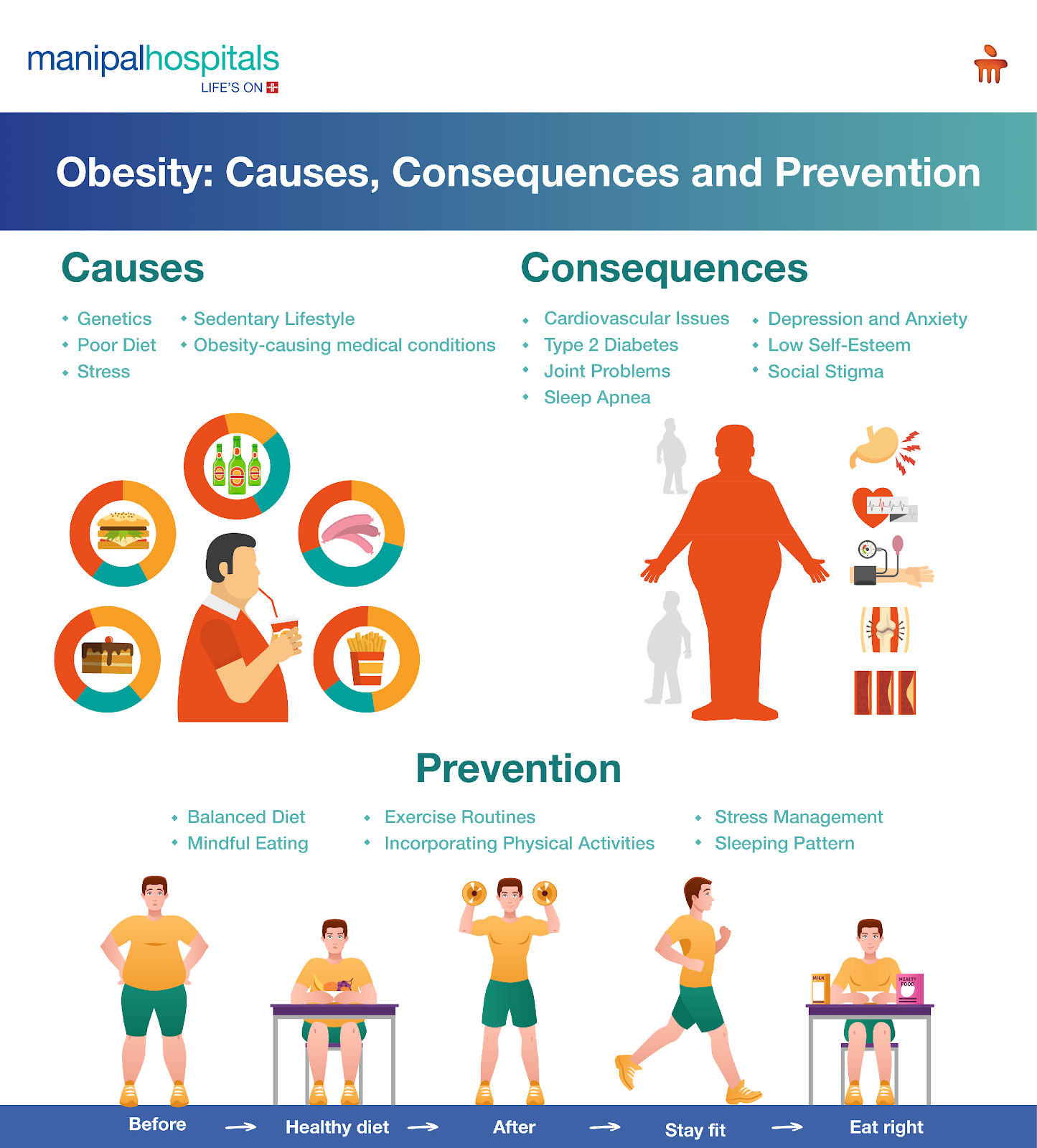
Obesity is a term that transcends mere numbers on a scale. It is a complex condition marked by the accumulation of excessive body fat and its impact reverberates through every facet of life. It’s not just about struggling to fit into your favourite pair of jeans; it’s about facing an increased risk of life-altering health problems. In a world where wellness and health are increasingly prioritized, obesity stands as a significant challenge, impacting millions of lives. WHO defines obesity as “abnormal or excessive fat accumulation that presents a health risk.” It’s an issue that knows no boundaries, affecting people of all ages, ethnicities and socioeconomic backgrounds.
World Obesity Atlas 2023 predicts that the global economic impact of obesity will reach $4.32 trillion annually by 2035. Also, a study on Obesity and the Influence of Dietary Factors found that the prevalence of overweight was 22.04% and obesity was 5.20%.

What are the Causes of Obesity?
Several factors are responsible for developing excess weight gain causes obesity, some of them are listed below:
- Genetics - Genetics plays a substantial role in determining an individual's susceptibility to obesity. Some people may inherit genes that make them more prone to weight gain, while others may inherit genes that enhance metabolism.
- Poor Diet: The availability of calorie-dense, nutrient-poor foods has surged in recent decades. Fast food, sugary drinks, and high-calorie snacks contribute to excessive calorie intake.
- Sedentary Lifestyle: Due to modern conveniences, physical activity has diminished. People spend more time sitting at desks or in front of screens and less time engaged in physical activities.
- Stress: The demands of contemporary life lead to increased stress levels, which can result in overeating and unhealthy food choices.
- Medical Conditions Contributing to Obesity: Certain medical conditions, such as polycystic ovary syndrome (PCOS), hypothyroidism, and hormonal imbalances, can predispose individuals to obesity. Additionally, medications like antidepressants, steroids, and antipsychotic drugs may lead to weight gain.
Side Effects of Obesity
- Cardiovascular Issues: Obesity is a leading cause of heart disease. It raises blood pressure, increases cholesterol levels, and elevates the risk of heart attacks and strokes.
- Type 2 Diabetes: Obesity is closely associated with insulin resistance, leading to the development of type 2 diabetes.
- Joint Problems: Carrying excess weight puts immense pressure on the joints, increasing the risk of osteoarthritis.
- Sleep Apnea: Obesity can result in obstructive sleep apnea, leading to disrupted sleep patterns and reduced oxygen intake during the night.
- Depression and Anxiety: The social and emotional impact of obesity can lead to depression and anxiety. The stigma associated with being overweight can take a significant toll on mental well-being.
- Low Self-Esteem: Struggling with body image and societal pressures, many obese individuals suffer from low self-esteem, which can further exacerbate mental health issues.
- Social Stigma: Obesity often carries a stigma that can result in discrimination and bias in various aspects of life, from employment opportunities to social interactions.
Prevention of Obesity
- Balanced Diet: A balanced diet rich in fruits, vegetables, lean proteins, and whole grains is the foundation of a healthy lifestyle.
- Portion Control: Controlling portion sizes is essential to avoid overeating.
- Mindful Eating: Being present and conscious while eating can help prevent mindless snacking and emotional eating.
- Exercise Routines: Engaging in regular exercise is critical. A mix of aerobic and strength-training exercises is effective for weight management.
- Incorporating Physical Activity into Daily Life: Simple changes like taking the stairs instead of the elevator or walking short distances can make a significant difference.
- Stress Management: Stress Management: Using stress reduction techniques, such as meditation, yoga, or counselling, can reduce emotional eating.
- Sleeping Pattern: Getting adequate and quality sleep is crucial for managing weight. Poor sleep patterns disrupt hormonal balance, increasing the risk of obesity.
Care and Management of Obesity
1. Professional Guidance
- Consulting Healthcare Providers: Seeking medical guidance is crucial for those struggling with obesity. Healthcare professionals can develop personalised strategies or may even suggest weight loss surgery, depending upon your condition.
- Nutritionists and Dietitians: Working with nutrition experts can help individuals tailor their diets to meet their specific needs and preferences.
- Personal Trainers: Personal trainers can design exercise routines suited to an individual's fitness level and goals.
2. Behavioural Changes
- Goal Setting: Setting realistic, achievable goals is essential for long-term success.
- Support Systems: Building a support network of friends, family, or support groups can provide encouragement and motivation.
3. Medical Interventions
- Medication: Some medications can assist in weight management when other strategies have been ineffective.
- Bariatric Surgery: In severe cases, bariatric surgery may be recommended by healthcare professionals. Health improvements and weight loss are possible with it.
- Long-Term Maintenance: Sustainable weight management requires ongoing effort, continuous monitoring, and maintaining the healthy habits developed during the weight loss process.
The Importance of a Holistic Approach
- Addressing the Root Causes: Obesity is not just about calorie intake and physical activity. It involves understanding the underlying genetic, environmental, and emotional factors that contribute to weight gain.
- The Role of Mental Health: Mental health support is crucial, as obesity often goes hand in hand with emotional challenges. Addressing the psychological aspects is integral to long-term success.
- Lifestyle Changes for Sustainable Results: Effective weight management is about adopting a lifelong commitment to healthy eating, regular exercise, and stress management.
Obesity is a complex health issue with far-reaching consequences and it doesn’t just stop at appearances. Several causes are responsible for developing the condition, including genetics, environmental and medical factors. There are both physical and mental effects associated with it, causing a cascade of problems.
Prevention and care for obesity require a multi-pronged approach. Healthy eating habits, regular physical activity, stress management, and sleep play integral roles. Seeking professional guidance, making behavioural changes, and considering medical interventions can provide the necessary support. You can also seek help from Manipal Hospitals, Vijayawada for any obesity-related concern.



















 4 Min Read
4 Min Read







.png)


